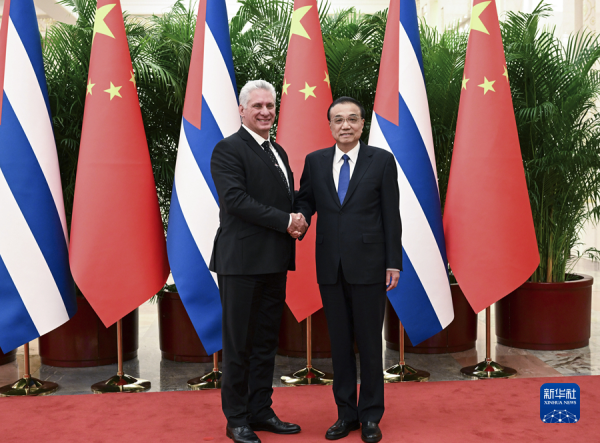China’s foreign ministry accused the US on Friday of “spreading rumours and slander”, after a report that Beijing has done a deal with Havana to set up an electronic eavesdropping facility on Cuba.
The sharp reaction followed a report by the Wall Street Journal that Cuba and China had reached an agreement in principle for Beijing to pay Havana “several billion dollars” for the spying installation.
The report, citing US officials familiar with classified intelligence, would allow Beijing to gather electronic communications from the island roughly 100 miles (160 km) from Florida across the southeastern United States, which is home to many US military bases, as well as monitor ship traffic.
ALSO SEE: US Senate Panel Backs Move to Strip China of ‘Developing’ Status
The agreement between the two US rivals, both ruled by communist governments, has caused alarm in President Joe Biden’s administration, the newspaper said, posing a new threat close to America’s shores.
The facility would allegedly enable China to monitor signals intelligence, including emails, phone calls, and satellite communications.
The US Central Command headquarters is based in Tampa. Fort Liberty, formerly Fort Bragg, the largest US military base, is in North Carolina.
The Journal said US officials declined to provide more details about the proposed location of the listening station or whether construction had begun.
China: ‘More slander’ from hacker empire
“As we all know, spreading rumours and slander is a common tactic of the United States,” Wang Wenbin, China’s foreign ministry spokesperson said.
“The United States is also the most powerful hacker empire in the world, and also veritably a major monitoring nation.”
John Kirby, spokesperson for the White House National Security Council, said on Thursday that the report was “not accurate,” but did not say what he thought was inaccurate.
He said the United States has had “real concerns” about China’s relationship with Cuba and was closely monitoring it.
Brigadier General Patrick Ryder, a US Defense Department spokesperson, said: “We are not aware of China and Cuba developing a new type of spy station.”
Cuba says claim is ‘unfounded’
In Havana, Cuban Vice Foreign Minister Carlos Fernandez de Cossio dismissed the report as “totally mendacious and unfounded,” calling it a US fabrication meant to justify Washington’s decades-old economic embargo against the island.
He said Cuba rejects all foreign military presence in Latin America and the Caribbean.
The reported deal could raise questions about a near-term visit to China that Secretary of State Antony Blinken is reportedly planning.
Washington and Beijing have been taking tentative steps to ease tensions that soured further after a suspected Chinese spy balloon crossed the US mainland early this year and and was shot down by the US military off the east coast.
That incident prompted Blinken to scrap a previous visit to Beijing.
Ties have deteriorated over disputes ranging from military activity in the South China Sea and near Taiwan, Beijing’s human rights record, and technology competition.
‘It’s a big deal’
Senator Mark Warner, chairman of the Select Committee on Intelligence, and Senator Marco Rubio, the panel’s vice chair, said in a statement they were “deeply disturbed” by the report and urged the Biden administration “to take steps to prevent this serious threat to our national security and sovereignty.”
A former US intelligence official said on condition of anonymity that a Chinese listening post would be a “big deal,” marking an expansion of Beijing’s spying capabilities and giving it access to signals intelligence as far north as Washington.
If such a facility is built, the Chinese will use Cuba “as a beachhead for collection against the United States,” Daniel Hoffman, a former senior CIA undercover officer, said.
However, the US has a long history of spying on China in its own neighborhood. It is widely reported to have used Taiwan as a listening post for the mainland and regularly flies spy planes in the South China Sea, angering Beijing.
The head of Taiwan’s National Security Bureau told the island’s parliament in April that Taiwan was conducting real-time encrypted intelligence sharing with Five Eyes partners, which includes the US.
Cuban economy sputtering, ties with US strained
A cash infusion would likely be welcomed in Cuba, where the economy is sputtering and inflation, fuel shortages, plunging farm production and a cash crunch continue to fan discontent.
Relations between Washington and Havana remain strained. The Biden administration last year partially rolled back some Trump-era restrictions on remittances and travel to the island, but Cuban officials called the steps insufficient.
The intelligence on the agreement was gathered in recent weeks and was convincing, the Journal reported. The officials said it would allow China to conduct signals intelligence, including emails, phone calls and satellite transmission.
Cuba, an old Cold War foe of the United States, has long been a hotbed of espionage and spy games.
The Cuban missile crisis in 1962 began after Moscow began placing Soviet nuclear weapons on the island. It backed down and removed the missiles, but it is widely regarded as the moment when the United States and the Soviet Union came closest to a nuclear confrontation.
The Soviets installed a spy base on the island at Lourdes, just south of Havana, in the mid-1960s, with parabolic antennas aimed at Cuba’s northern neighbour. Russian President Vladimir Putin closed the facility in the early 2000s.
- Reuters with additional editing by Jim Pollard
NOTE: This report was updated on June 9, 2023 with minor edits and links.
ALSO SEE:
World Big Enough for China And US, Says Beijing’s Defence Chief
Biden Urged to Hit Back at China Over Micron Ban, Rally Allies
China Stages Military Drills Around Taiwan Over Tsai’s US Trip
US Speaker Meets Taiwan’s Tsai, Keen to Boost Arms Support
Report Says China Uses Software Flaws for Cyber Attacks – Register
























